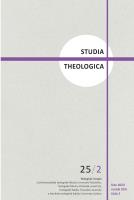Purgatio canonica v stredovekom kánonickom práve
Purgatio canonica in Medieval Canon Law
Author(s): Vojtech VladárSubject(s): Middle Ages, Theology and Religion, Canon Law / Church Law
Published by: Univerzita Palackého v Olomouci
Keywords: Procedural law; Ordeals; Secular Law; Compurgators; Canon Law; Purgatio canonica; Ius commune; Roman‑Canonical Procedure; Procedural Application;
Summary/Abstract: In the period of the Early Middle Ages, the institution of the so‑called purgatory oath, set in accordance with traditional rules of German criminal law, was commonly applied in the secular forums. It predominated in certain countries, whereas in others it “only” supplemented other proper evidence, especially several types of ordeals or in various ways treated testimonies. Its essence consisted in the swearing of a suspicious person before the deity on his or her innocence in a specified term and attended by a defined number of compurgators. This transcendental aspect had to appeal to the conscience of the swearer with fear of the perjury and sanctions connected with it (not only on temporal, but on primarily a metaphysical level). After its Christianization by theologians, but especially canonists to purgatio canonica it was transformed into ius commune, where it was applied within the frame of the generally accepted Roman‑Canonical procedure. In this form it managed in a more or less definite way to replace the older types of so‑called common purgation and to direct at the same time the entire procedure of probation from metaphysics towards ratio. The main goal of the article is to define more closely the conception of these types of the oaths in Medieval canon law including the ways of its procedural application in then Church, as well as in secular courts.
Journal: Studia theologica
- Issue Year: XXV/2023
- Issue No: 2
- Page Range: 73-98
- Page Count: 26
- Language: Slovak

